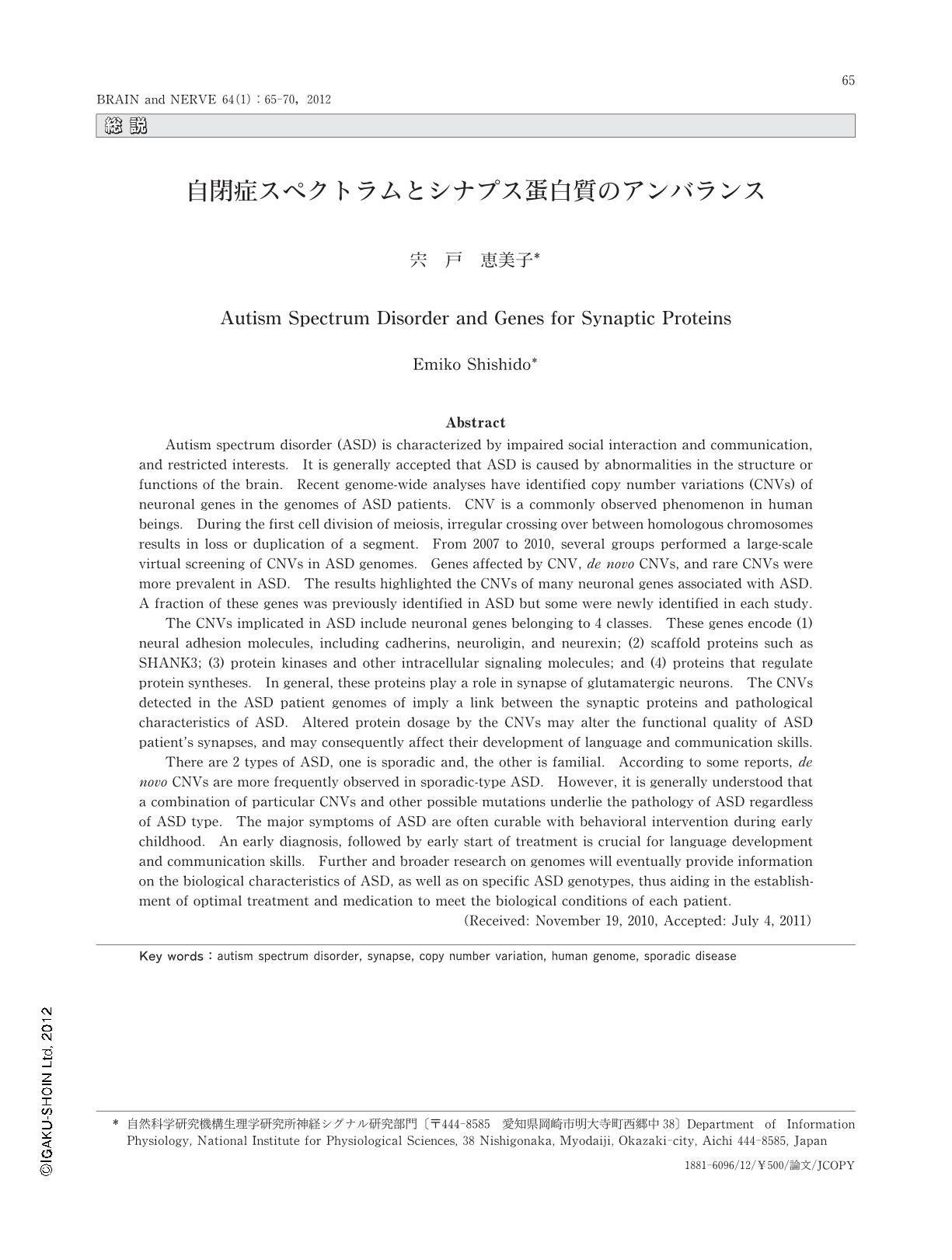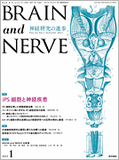Japanese
English
- 有料閲覧
- Abstract 文献概要
- 1ページ目 Look Inside
- 参考文献 Reference
はじめに
1943年にアメリカの精神科医Leo Kannerがはじめて報告して以来,自閉症スペクトラム(autism spectrum disorder:ASD)は多くの人にとってミステリアスな病気だった1)。診断基準については,1970年にイギリスの児童精神科医Lorna Wingが「自閉症の3つ組」と呼ばれる中心的症状を定義し,社会性の問題,コミュニケーションの問題,想像力の問題という3つの性質によって特徴づけられるようになった2,3)。ASDには言語的なコミュニケーションの遅れが著しく知的障害を伴うグループと,言語的なコミュニケーションに大きな障害がないグループがあり,後者には高機能自閉症やアスペルガー症候群が含まれる3)。
自閉症の原因については,①生育環境や内分泌攪乱物質などによるとされる環境要因説,②家系や遺伝子の突然変異に原因があるとする遺伝的要因説,③DNAメチル化などの影響を考慮に入れたエピジェネティクス要因説が考えられ,半世紀以上にわたり研究や報告がなされてきた2,4,5)。しかし,これらが時としてASDの症状の特異性とあいまって,さまざまな流言や憶測を生んできたのもまた事実である。同時代に家庭に普及したテレビの視聴をはじめとするメディアが問題だとされたこともあるし,水銀原因説からワクチン接種への疑いがもたれた時期もある4)。ASDの症状を合理的に説明するだけの原因がわからないため,治療法についても,効果が検証されたもの,されていないものを含めて一過的な流行を作ることがしばしばあった。しかし,2007年にASD患者の全ゲノムDNAへのアプローチが報告されて以来,こうした情勢は大きく変わりつつある。ASD患者の全ゲノムを網羅的に調べることにより,ASDと特定の遺伝子のコピー数に相関関係があることがわかった。そして,多くの場合に神経のシナプスを構成する蛋白質の遺伝子コピー数が,通常と異なることがわかってきた。このことから,ASDの発症に神経シナプス蛋白質のアンバランスが関与することが想定されるようになった。
Abstract
Autism spectrum disorder (ASD) is characterized by impaired social interaction and communication, and restricted interests. It is generally accepted that ASD is caused by abnormalities in the structure or functions of the brain. Recent genome-wide analyses have identified copy number variations (CNVs) of neuronal genes in the genomes of ASD patients. CNV is a commonly observed phenomenon in human beings. During the first cell division of meiosis, irregular crossing over between homologous chromosomes results in loss or duplication of a segment. From 2007 to 2010, several groups performed a large-scale virtual screening of CNVs in ASD genomes. Genes affected by CNV, de novo CNVs, and rare CNVs were more prevalent in ASD. The results highlighted the CNVs of many neuronal genes associated with ASD. A fraction of these genes was previously identified in ASD but some were newly identified in each study.
The CNVs implicated in ASD include neuronal genes belonging to 4 classes. These genes encode (1) neural adhesion molecules, including cadherins, neuroligin, and neurexin; (2) scaffold proteins such as SHANK3; (3) protein kinases and other intracellular signaling molecules; and (4) proteins that regulate protein syntheses. In general, these proteins play a role in synapse of glutamatergic neurons. The CNVs detected in the ASD patient genomes of imply a link between the synaptic proteins and pathological characteristics of ASD. Altered protein dosage by the CNVs may alter the functional quality of ASD patient's synapses, and may consequently affect their development of language and communication skills.
There are 2 types of ASD, one is sporadic and, the other is familial. According to some reports, de novo CNVs are more frequently observed in sporadic-type ASD. However, it is generally understood that a combination of particular CNVs and other possible mutations underlie the pathology of ASD regardless of ASD type. The major symptoms of ASD are often curable with behavioral intervention during early childhood. An early diagnosis, followed by early start of treatment is crucial for language development and communication skills. Further and broader research on genomes will eventually provide information on the biological characteristics of ASD, as well as on specific ASD genotypes, thus aiding in the establishment of optimal treatment and medication to meet the biological conditions of each patient. (Received: November 19,2010,Accepted: July 4,2011)

Copyright © 2012, Igaku-Shoin Ltd. All rights reserved.


